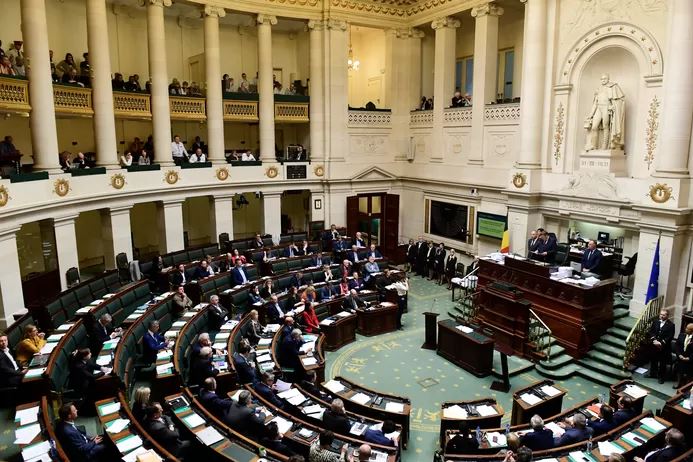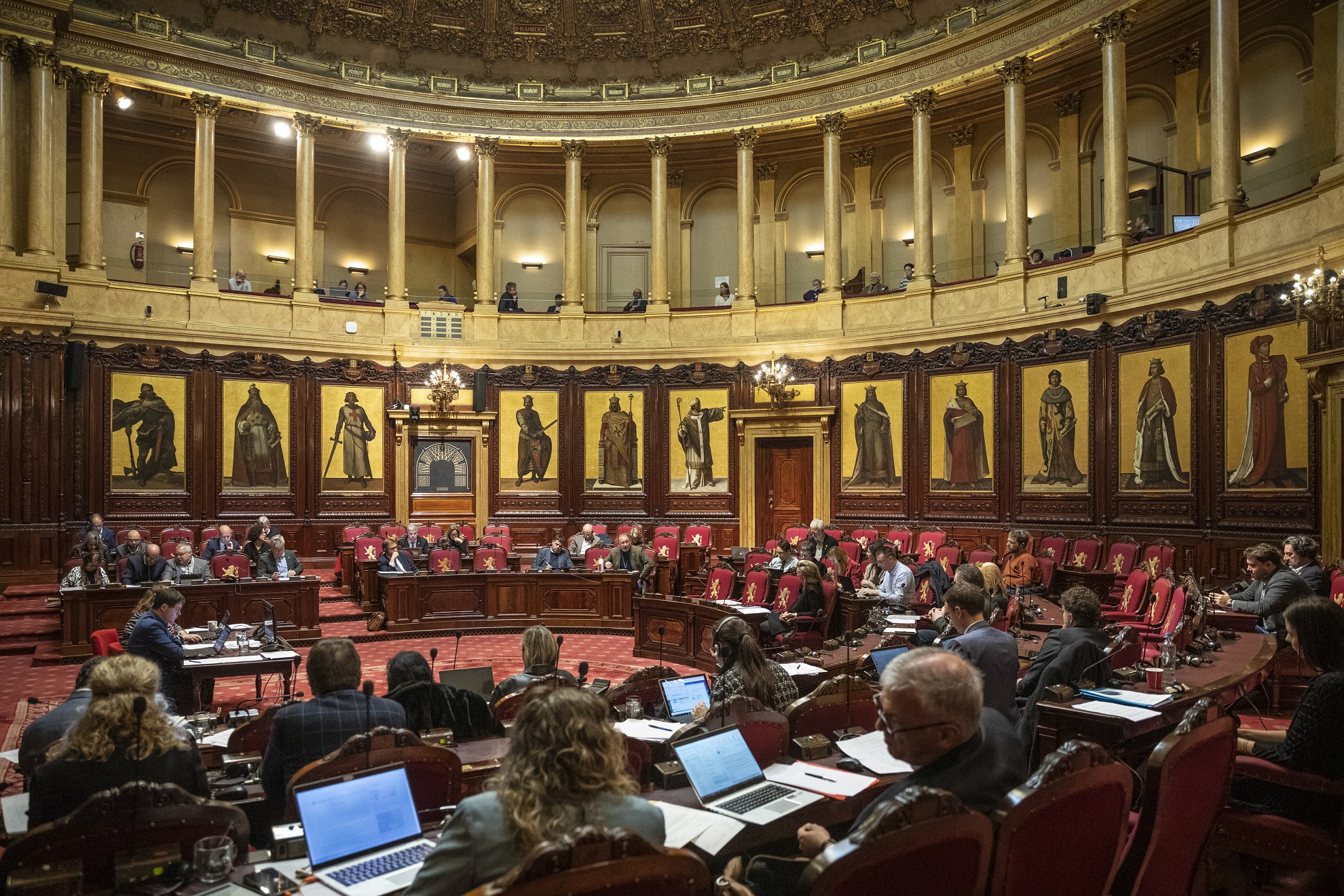The elections are coming up. On 9 June, people in Belgium go to the polls to vote in federal, regional and European elections. Even for seasoned locals, the process can be confusing, so here is our guide to what it means.
Is voting compulsory? What if you don’t go?
Belgium is one of the few countries in the world where turning up to vote is compulsory. The compulsory bit is not the voting itself, but the attendance.
In practice, this means that all adult citizens have to go to the polling station on election day with their registration letter and identity card - although whether they cast a valid, invalid or blank vote (or do not vote at all) is up to them.
In 2019, more than one million Belgians – nearly 10% of the country's population and about 20% of those eligible to vote – refused to support anyone on the ballot. They did so either by not showing up at all or by casting a blank or an invalid one.
While people who do not show up at the polling station officially risk a penalty of €40 up to €80, they are rarely prosecuted and seldom fined.
Can you vote in the federal, regional and European elections?
Those getting lost in Belgian elections news in recent months would be forgiven their confusion: the country will vote five times in 2024. The first time is arguably the most important one: on 9 June, the European, federal and regional elections will all coincide. A few months later, on October 13, the municipal and provincial elections will follow.
While expats in Brussels won't have their say in all of these elections, they have to remember both dates: they can vote in the European elections in June, and those who are registered to vote can also do so for the municipal ones in October. The EU vote is bigger in scale, but the local one has an impact closer to home: namely on who makes the decisions in their own municipality – in turn influencing decisions made by (and for) the entire Brussels-Capital Region.
Belgium
For most Belgians, the most important this year will be the federal elections, in which all 150 seats of the Chamber of Representatives are up for election. An absolute majority, or 76 seats, is needed to form a government. The parties who did not make it into the government effectively become the opposition.

Chamber of Representatives
These 150 seats hail from 11 electoral districts, which are Belgium’s ten provinces and the Brussels-Capital Region. Each district’s seats are proportional to its population (which is not the same as its number of voters), from four in Luxembourg province to 24 in Antwerp. Voters in Brussels account for 15 seats.
For many, this election is especially important as its results will likely determine whether Vlaams Belang, the Flemish separatist and anti-immigrant party, will break through the so-called ‘cordon sanitaire’, an agreement by all political parties to isolate and exclude the extreme right in any form of government, in place since 1989.
The previous federal elections in 2019 effectively split Belgium in two as Flanders voted overwhelmingly to the right while the majority in Wallonia voted to the left. If opinion polls in the run-up to these elections hold up, the divide will only become greater this time around.
A political split along language lines would greatly complicate the country’s already very complex government formation process – an epic feat that has historically taken nearly two years to complete: after the elections in June 2010, the government was only sworn in December 2011 (541 days of negotiations later), and after the country went to the polling stations in May 2019, it took until October 2020 (494 days later) to figure out the coalition puzzle – and over 600 days since the previous government fell in December 2018.
The months-long negotiations – further complicated by the Covid-19 pandemic – led to the current seven-party government, nicknamed the ‘Vivaldi coalition’ by the Belgian media.
The coalition, which needed seven parties to reach a majority, received its name because its four components reflected the Italian composer Vivaldi’s Four Seasons: red for socialists PS and Vooruit; blue for liberals MR and Open VLD; green for ecologists Ecolo and Groen; and orange for Christian democrats CD&V.
Importantly, this government composition excludes the Flemish right-wing N-VA as well as Vlaams Belang, despite them emerging as the biggest two parties in Flanders.
The European Union
For those who somehow managed to miss it, the European Parliament elections fall on the same day as Belgium’s federal and regional ones. While Belgians are the only ones able to vote in the latter two, the former one is also open to other EU citizens living in the country. But there are some conditions.
Non-Belgian EU citizens wanting to vote need to have their main residence in a Belgian municipality (permanent residency is not needed) and must have registered to vote before 31 March – either online or at the local municipal hall. Those who registered and were approved in the past (for the 2019 EU elections, for example) do not have to do it again, as they are automatically registered for all European elections to come.
Importantly, once you have been approved, and you have received the official letter to prove it, you are legally required to go to the polling booth on election day – as are all Belgian citizens over 18. Like Belgians, registered EU citizens who fail to show up technically risk a fine, but there are no known instances of this happening.
This year, voters in Belgium will elect 22 MEPs of the 720 sitting in the European Parliament.
People can only vote for one party on the list and do so by casting a vote in the box at the top of a list (block-list voting), or by doing so in the box next to the name of one or more candidates (preference voting). Casting votes on different lists is not allowed: your vote will be considered invalid and won’t be counted.
You shouldn’t have to go far to vote as each municipality should have at least one polling station. However, if you cannot make it there on election day – because you are ill, have to work or are studying abroad, for example – you can appoint a proxy to vote for you. Importantly, only Belgian citizens can be a proxy for EU citizens.
Regional elections
The regional elections take place across Belgium on the same day. This means electing members of the Flemish Parliament, the Brussels Capital Parliament, the Walloon Parliament and the Parliament of the German-speaking Community.
To complicate matters, there is also the Parliament of the French Community, but this one is not directly elected and is instead composed of members of the Walloon Parliament and French-speaking members of the Brussels Capital Parliament.

Brussels Parliament
Like the federal elections, only Belgian citizens can cast their votes and only for the region they live in. Someone living in Antwerp, for example, cannot vote in Brussels.
In the Brussels-Capital Region, 89 seats will be elected for the regional parliament. Of those, 72 representatives will be French-speaking, while 17 will be Dutch-speaking – these are elected on separate French-speaking and Dutch-speaking lists.
Interestingly, Brussels citizens are the only ones in Belgium who can decide if they want to vote for a French-speaking or Dutch-speaking party – the language they speak in their daily lives is not important, only what party they want to vote for. Those choosing to vote for a Dutch-speaking party in Brussels have an extra vote, however, as they are also allowed to vote for a party in Flanders; Brussels residents elect six seats in the Flemish Parliament.
To form the Brussels Capital Region government, an absolute majority (45 seats out of 89) is needed. What makes Brussels a special case, however, is that the government must also have a majority per language group.
In practice, this means that at least nine of the 17 seats must go to Dutch speakers, and at least 37 of the 72 seats must go to French speakers.

